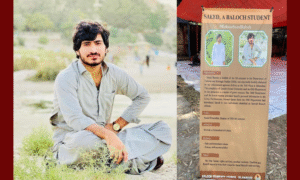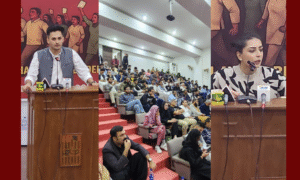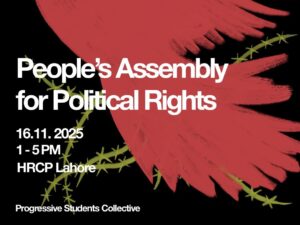Aliya* interviews a domestic helper who works inside the residential community for retired military personnels and private upper-class citizenry in Lahore. Damning details about class discrimination, inhumane modes of surveillance and stark social inequalities come to surface.
While the pseudo-revolutionaries hail the win of democracy, I sit on my desk trying to comprehend if it means anything for me or hundreds of those miserable people who are walking around dead on bustling streets, in the scorching heat of July, some with their grad. degrees and others with tools in hands, hoping to land a place which pays them enough money and respect for their labour, just enough to provide their families with a decent, human life.
A few days back, I got the chance to sit with a 17 years old domestic worker who works at one of the many Askari residential communities in Lahore, Askari X( there are up to 11) allocated for retired army personnels. While the plots of Askari X keep sprawling, the respect for the basic human rights of the workers has shrunk considerably.
Barkat* leaves her home in Tehra village, some 14 km east of Lahore Ring Road, sharp at 8 with her mother on a rickshaw and reaches Askari X by 8:20. She handles the kitchen work at a house. Her work includes making two meals, doing dishes, cleaning the kitchen and everything in between. ‘ As long as I’m there, I keep working; once free from the kitchen work, I do ironing and dusting etc. My shift ends by 4 in the evening and then I go home with my mother as she gets free from cleaning three different houses in the society.’
Barkat gets 10k per month for her 8-hours labour everyday. Her mother cleans three 12-marla houses daily and each house pays her 5k per month for her services. This amount has been fixed by the Askari X management and no worker can ask above the fixed value. Interestingly, the salaries of the workers were fixed ages ago and since then, no one has bothered to align the salaries with the spiking inflation. Barkat and her mother make 25k per month altogether and 12k out of their total salary is spent on the rickshaw fare that they use to commute to their workplace. This leaves them with a meagre amount of 13k per month in return for a combined 16 hours of labour per day for the whole month. And yet when I asked the minor girl if she’s been underpaid, her innocence unmasked the hypocrisy of our elite, ‘ Yes I think I deserve 1-2 thousand rupees more?’ It was more of a question than an answer. The child was too young to even decipher the value of her labour, in fact too young for labour itself.
‘Sometimes we don’t have money to buy food. This happens usually when a family member falls sick and all the money is spent on their medicines.’ Water, electricity, education, recreation etc had ceased to be on her wish list long ago.
The current price of a 10-Marla house in the newly built sector of Askari X is around 4.5 crore. And inside these big houses live small people who will spend 20k on a dinner but when it comes to paying the workers for their services, the same rhetoric, ‘ We live in the same country too. Inflation affects us too. We cannot afford to pay that much’ starts echoing and puts to shame the imported furniture and high ceilings of the 10-marla houses. For Barkat, the only problem her family has to face due to the lack of money is food shortage. ‘ Sometimes we don’t have money to buy food. This happens usually when a family member falls sick and all the money is spent on their medicines.’ Water, electricity, education, recreation etc had ceased to be on her wish list long ago. They were not basic human rights anymore. In the child’s mind, not having enough to eat was the only problem in her life and that too, she thought, could be solved if she could earn 1-2k more per month.
As if exploiting the domestic workers was not enough of an evidence of the dead conscience of the residents of one of the elite housing societies in Lahore, the inhumane treatment meted out against the domestic help by the residential management (REC) led by retired military personnels has proved to be the final nail in the coffin.
Barkat told me that she and her mother have an entry pass that is necessary to let them inside the society, which costs Rs 500 and has to be updated every 6 months. Those 500 rupees every 6 months, are of course for the arrangements to baptise the workers before they set foot in the Holy Land of the bourgeois.

The REC keeps launching such ludicrous ventures to satisfy the egos of its residents and keep them up-to-date regarding the supremacy of their race. A few months back, a notification was issued by the management that was celebrated among the majority of the residents as the ultimate stamp on the authenticity of their clean and pure race. The circular categorically asked the male workers to only wear white Shalwar kameez with white prayer cap while the females were asked to wear simple and plain white clothes with zero touch of face makeup. The purpose being to help distinguish the outsiders and people of the Holy Land.

Much to the satisfaction of the residents, this step has further eased the effort to spot workers in parks and report it to REC, as workers are strictly prohibited to enter the park premises lest they damage the nicely trimmed grass with their rough, calloused feet.
To make the society more safe and sound for its residents, the intelligence( of course just a little less apt than the country’s Intelligence) department of the management came up with another ingenious measure: ‘Maids and servants cannot use smart phones. They are only allowed to use simple mobiles.’ One simple step has made the security alert board of the colony go back to the green area, much to the relief of its residents.
‘Yes, the guards at the main gate said we can’t enter with makeup on our face. I don’t care. I don’t have money to buy makeup anyway. And who will wear makeup if she has to spend 8 long hours in the kitchen in this sweltering heat,’ Barkat could not make anything of the No Makeup policy of the management.

As we discuss the living conditions of workers who work in these gentrified gated communities, it is indispensable to dive into the sociological context of these secluded elite residential areas. Rabail Abid, in her 2015 paper titled ‘Socio spatial sprawl of inequality’ presents an articulate case study of such proliferating communities in Lahore. According to Rabail, working class neighbourhoods around these luxurious housing schemes stand in stark opposition to their wide roads and golf courses. This indeed is the case for Askari 10, which is situated just a few kilometres away from one of the poorest and crowded areas of Lahore, Joray Pul, Chungi. Most of the domestic help for Askari residents come from these urban slums.
Rabail, also makes the case for understanding the sprawl of these communities in terms of the Marxist conception of primitive accumulation. Most of the rural land to the south of Lahore has been acquired by private housing societies by forceful displacement of the people. Recently I got the chance to visit Askari 11 as well. The society is built upon the rural Bedian side, colliding directly with many villages. Infact, a few routes from inside the scheme lead directly to villages rife with poverty and deprivation. These villagers are at high risk of further dispossession and displacement and are forced to work low paid jobs in these elite societies. Their land has been commodified by what Ayesha Saddiqa refers to as the ‘Milbus’, the military corporate ventures. This makes for spiking divides and simmering tensions between these different classes. Walking through these earthly heavens each day and coming back to their dilapidated homes, children like Barkat are struck by the unfairness of this system.
Our parasitical elite needs to get their heads out of their bungalows to realise their dependency on the workers and the price they might have to pay one day for the exploitation of the working class. For, I believe, the volcano is about to erupt in no time.
*Names have been changed for privacy concerns.
The writer is a student and the Editorial board member at The Students Herald. She is also a member of the Progressive Students’ Collective.




